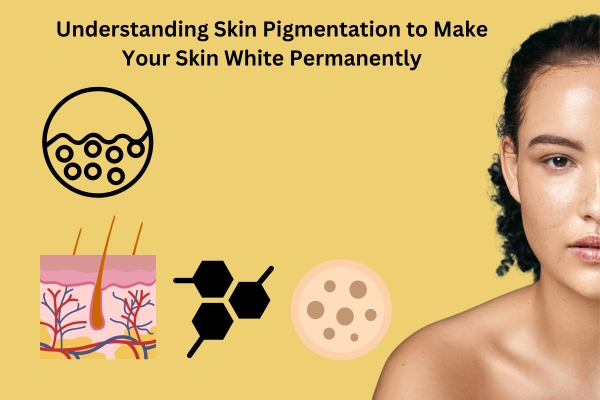Table of Contents
The desire to make your skin white permanently has intrigued skincare enthusiasts, beauty experts, and dermatologists worldwide. For many, achieving a brighter complexion means reducing hyperpigmentation, evening out skin tone, or addressing skin concerns like melasma and dark spots. However, the pursuit of lighter skin should always be based on safe, ethical, and well-informed skincare choices rather than unrealistic expectations or harmful practices.
This guide explores the key factors that influence skin pigmentation, debunks myths about permanent skin whitening, and highlights safe, dermatologist-approved methods for achieving a naturally radiant complexion.
Understanding Skin Pigmentation to Make Your Skin White Permanently

To understand how to make your skin white permanently, it’s crucial to identify the key factors that influence skin pigmentation. Here’s what determines your skin’s color:
1. Genetics
Your genes primarily determine your inherent skin color. The amount and type of melanin—a pigment produced by melanocyte cells—play a crucial role in your skin tone.
2. Sun Exposure
Prolonged exposure to UV rays stimulates melanocytes to produce more melanin, leading to a darker complexion over time. This is why sunscreen is essential.
3. Hormonal Changes
Hormonal fluctuations, due to pregnancy, medications, or health conditions, can impact melanin production, leading to discoloration or uneven skin tone.
4. Underlying Health Conditions
Skin conditions such as melasma, vitiligo, or post-inflammatory hyperpigmentation can cause changes in skin color.
Understanding these factors will help you make informed decisions about skin whitening techniques that are safe and effective.
Myths vs. Facts About Skin Whitening

There are many misconceptions about achieving lighter skin, and it’s time to separate myths from facts to ensure a safe approach.
Myth 1: Skin Whitening Is Immediate
Fact: Permanent skin lightening is a gradual process. Be skeptical of products or treatments that promise instant results.
Myth 2: All Natural Ingredients Are Safe
Fact: While natural remedies might seem harmless, some ingredients can irritate the skin or cause allergic reactions. Always test a patch before full use.
Myth 3: Fair Skin Equals Healthy Skin
Fact: Skin health should always take priority over color. Even-toned, well-hydrated skin, no matter the shade, is a sign of healthy skin.
Myth 4: Over-the-Counter Products Are Always Safe
Fact: Many OTC products contain harmful chemicals like mercury or steroids. Always check the ingredient list or consult a dermatologist before trying new products.
Safe and Effective Methods to Make Your Skin White Permanently

When considering how to make your skin white permanently, it’s essential to choose methods that prioritize safety and long-term skin health. Here’s a breakdown:
1. Natural Remedies
- Lemon Juice and Honey Mask:
Lemon contains natural bleaching properties, while honey nourishes the skin.
Apply a mixture of lemon juice and honey to your face, leaving it on for 15 minutes before rinsing.
- Turmeric and Yogurt Face Pack:
Turmeric helps reduce pigmentation, and yogurt brightens the skin.
Mix 1 teaspoon of turmeric with 2 tablespoons of yogurt. Apply to your skin for 20 minutes before rinsing.
2. Over-the-Counter Skin Whitening Products
Look for products that contain the following safe and effective ingredients:
- Vitamin C: Brightens skin tone and reduces dark spots.
- Niacinamide: Reduces redness and evens out skin tone.
- Kojic Acid: A natural ingredient that helps in melanin reduction.
- Alpha Arbutin: Helps lighten skin pigmentation without harsh side effects.
Top Recommendations:
3. Professional Treatments to Make Your Skin White Permanently
Consider consulting a dermatologist for advanced skin-lightening options:
- Chemical Peels:
- Removes the top layer of skin to reduce pigmentation.
- Laser Treatments:
- Targets melanin to lighten dark spots or even out skin tone.
- Microdermabrasion:
- Exfoliates and rejuvenates the skin.
The Role of Skincare Routines

A consistent skincare routine is key to maintaining long-term skin health and improving tone:
- Cleanse:
- Use a gentle cleanser to remove dirt and impurities.
- Exfoliate:
- Exfoliate 1–2 times a week to remove dead skin cells.
- Moisturize:
- Keep your skin hydrated with a nourishing moisturizer.
- Apply Sunscreen:
- Use SPF 30 or higher daily to prevent UV damage and further pigmentation.
Lifestyle Changes for Long-Lasting Results
Healthy lifestyle habits can significantly influence your skin tone and overall complexion:
- Dietary Choices:
- Eat foods rich in antioxidants (berries, spinach) and vitamin E (nuts, seeds) for glowing skin.
- Hydration:
- Drink at least 2–3 liters of water daily to keep skin plump and hydrated.
- Sun Protection:
- Avoid direct sun exposure during peak hours and use protective clothing.
- Stress Management:
- Practice yoga or meditation to reduce stress, which can exacerbate skin conditions.
Consultation with Professionals

Before starting any skin-lightening regimen, consult a dermatologist or certified skincare expert. They can assess your unique skin type and recommend treatments tailored to your needs.
Focus on Self-Acceptance and Healthy Decisions
While this guide explains how to make your skin white permanently, it’s important to remember that beauty isn’t defined by skin color. Prioritize skin health, self-love, and confidence over societal beauty standards.
Explore More on Skin and Wellness Visit our blog for more helpful skin care tips and wellness guides. Subscribe today to stay updated!
Subscribe to our newsletter!





0 Comments